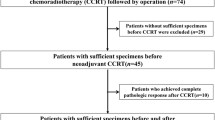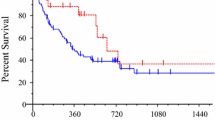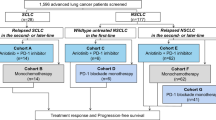Abstract
The cytotoxic effects of gemcitabine (G) and cisplatin (C) seem to occur through induction of apoptosis. To examine whether the efficacy of GC chemotherapy might be influenced by the expression of death receptor 5 (DR5) and Bcl-2 of the tumor, we investigated the correlation between the tumor response rate and DR5 and Bcl-2 expression in a series of patients prospectively treated with GC. Thirty-four chemotherapy naïve patients with advanced non-small-cell lung cancer (NSCLC) received intravenously 1000 mg/m2 gemcitabine on d 1 and 8 along with 80 mg/m2 cisplatin on d 2, every 21 d. Tumor specimens were analyzed for DR5 and Bcl-2 expression by immunohistochemistry. The objective response rate was 56% (19 of 34 patients). With median follow-up of 10 mo, the predicted median survival time was 12 mo (95% confidence interval [CI], 9–15 mo). Eleven (32%) and 14 (41%) NSCLC cases were found positive for DR5 and Bcl-2, respectively. The response rate was significantly higher in patients with DR5 expression than those without DR5 expression (91% vs 39%; p=0.008). Patients with Bcl-2 expression were apparently less responsive than those without Bcl-2 expression (21% vs 80%; p=0.001). DR5 and Bcl-2 expression was significantly associated with response to GC chemotherapy. Therefore, DR5 and Bcl-2 status are useful factors for predicting the efficacy of GC.
Similar content being viewed by others
References
Sandler, A.B., et al. (2000). Phase III trial of gemcitabine plus cisplatin versus cisplatin alone in patients with locally advanced or metastatic non-small-cell lung cancer. J. Clin. Oncol. 18:122–130.
Cardenal, F., et al. (1999). Randomized phase III study of gemcitabine-cisplatin versus etoposide-cisplatin in the treatment of locally advanced or metastatic non-small-cell lung cancer. J. Clin. Oncol. 17:12–18.
Crino, L., et al. (1999). Gemcitabine and cisplatin versus mitomycin, ifosfamide, and cisplatin in advanced non-small-cell lung cancer: a randomized phase III study of the Italian Lung Cancer Project. J. Clin. Oncol. 17:3522–3530.
Huisman, C., et al. (2001). Combination of gemcitabine and cisplatin for advanced non-small cell lung cancer: a phase II study with emphasis on scheduling. Lung Cancer 33:267–275.
Yang, Z., et al. (2000). Decreased cisplatin/DNA adduct formation is associated with cisplatin resistance in human head and neck cancer cell lines. Cancer Chemother. Pharmacol. 46:255–262.
Huang, P. and Plunkett, W. (1995). Induction of apoptosis by gemcitabine. Semin. Oncol. 22(4 Suppl. 11):1–25.
Igney, F.H. and Krammer, P.H. (2002). Death and antideath: tumour resistance to apoptosis. Nature Rev. Cancer 2:277–288.
Houghton, J.A. (1999). Apoptosis and drug response. Curr. Opin. Oncol. 11:475–481.
Odoux, C., et al. (2002). TRAIL, FasL and blocking anti-DR5 antibody augment paclitaxel-induced apoptosis in human non-small-cell lung cancer. Int. J. Cancer 97:458–465.
Ibrahim, S.M., et al. (2001). Pancreatic adenocarcinoma cell lines show variable susceptibility to TRAIL-mediated cell death. Pancreas 23:72–79.
Park, W.S., et al. (2001). Inactivating mutations of KILLER/DR5 gene in gastric cancers. Gastroenterology 121:1219–1225.
Lee, S.H., et al. (1999). Alterations of the DR5/TRAIL receptor 2 gene in non-small cell lung cancers. Cancer Res. 59:5683–5686.
Zhang, X.D., et al. (2000). Differential localization and regulation of death and decoy receptors for TNF-related apoptosis-inducing ligand (TRAIL) in human melanoma cells. J. Immunol. 164:3961–3970.
Wu, G.S., et al. (1999). Molecular cloning and functional analysis of the mouse homologue of the KILLER/DR5 tumor necrosis factor-related apoptosis-inducing ligand (TRAIL) death receptor. Cancer Res. 59:2770–2775.
Gibson, S.B., et al. (2000). Increased expression of death receptors 4 and 5 synergizes the apoptosis response to combined treatment with etoposide and TRAIL. Mol. Cell. Biol. 20:205–212.
Nimmanapalli, R., et al. (2001). Pretreatment with paclitaxel enhances apo-2 ligand/tumor necrosis factor-related apoptosis-inducing ligand-induced apoptosis of prostate cancer cells by inducing death receptors 4 and 5 protein levels. Cancer Res. 61:759–763.
Liu, W., et al. (2001). Tumor necrosis factor-related apoptosis-inducing ligand and chemotherapy cooperate to induce apoptosis in mesothelioma cell lines. Am. J. Respir. Cell. Mol. Biol. 25:111–118.
Nagane, M., et al. (2000). Increased death receptor 5 expression by chemotherapeutic agents in human gliomas causes synergistic cytotoxicity with tumor necrosis factor-related apoptosis-inducing ligand in vitro and in vivo. Cancer Res. 60:847–853.
Miyashita, T. and Reed, J.C. (1992). bcl-2 gene transfer increases relative resistance of S49.1 and WEHI7.2 lymphoid cells to cell death and DNA fragmentation induced by glucocorticoids and multiple chemotherapeutic drugs. Cancer Res. 52:5407–5411.
Bold, R.J., Chandra, J. and McConkey, D.J. (1999). Gemcitabine-induced programmed cell death (apoptosis) of human pancreatic carcinoma is determined by Bcl-2 content. Ann. Surg. Oncol. 6:279–285.
Sun, S.Y., et al. (2001). Overexpression of BCL2 blocks TNF-related apoptosis-inducing ligand (TRAIL)-induced apoptosis in human lung cancer cells. Biochem. Biophys. Res. Commun. 280:788–797.
de Almodovar, C.R., et al. (2001). The differential sensitivity of Bcl-2-overexpressing human breast tumor cells to TRAIL or doxorubicin-induced apoptosis is dependent on Bcl-2 protein levels. Oncogene 20:7128–7133.
Han, J.Y., et al. (1999). The relationship between cisplatin-induced apoptosis & p53, bcl-2, and bax expression in human lung cancer cells. Kor. J. Intern. Med. 14:42–52.
Ozawa, F., et al. (2001). Effects and expression of TRAIL and its apoptosis-promoting receptors in human pancreatic cancer. Cancer Lett. 163:71–81.
Katabami, M., et al. (1998). p53 and Bcl-2 expression in pneumoconiosis-related pre-cancerous lesions and lung cancers: frequent and preferential p53 expression in pneumoconiotic bronchiolar dysplasias. Int. J. Cancer 75:504–511.
Simon, R. (1998). Design, analysis, and reporting of cancer clinical trials, in Biopharmaceutical Statistics for Drug Development, (Peace, K.E., ed.), pp. 459–488, Dekker, New York.
Schiller, J.H., et al. (2002). Comparison of four chemotherapy regimens for advanced non-small cell lung cancer. N. Engl. J. Med. 346:92–98.
Kelly, K., et al. (2001). Randomized phase III trial of paclitaxel plus carboplatin versus vinorelbine plus cisplatin in the treatment of patients with advanced non-small-cell lung cancer: a Southwest Oncology Group trial. J. Clin. Oncol. 19:3210–3218.
Author information
Authors and Affiliations
Corresponding author
Rights and permissions
About this article
Cite this article
Han, JY., Hong, E.K., Choi, B.G. et al. Death receptor 5 and Bcl-2 protein expression as predictors of tumor response to gemcitabine and cisplatin in patients with advanced non-small-cell lung cancer. Med Oncol 20, 355–362 (2003). https://doi.org/10.1385/MO:20:4:355
Received:
Accepted:
Issue Date:
DOI: https://doi.org/10.1385/MO:20:4:355




